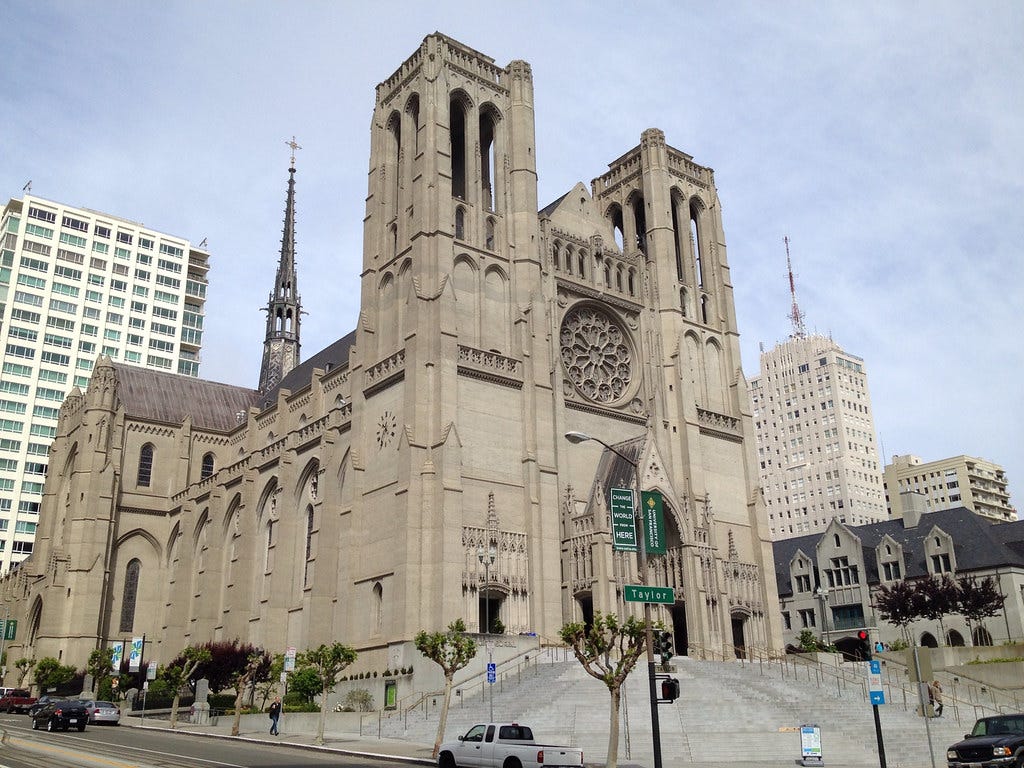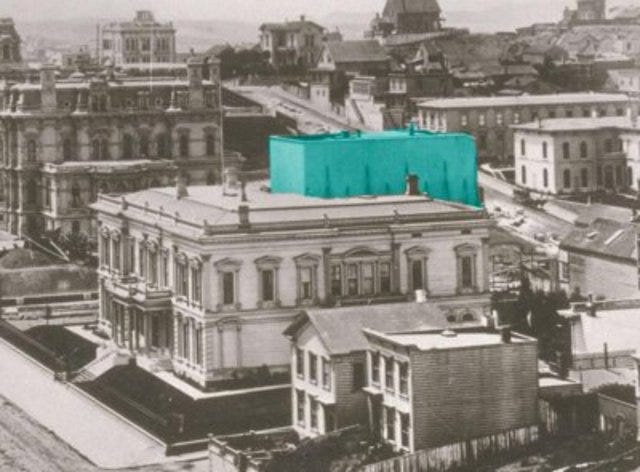From spite to grace
This one might be a little bit too on-the-nose, but what the heck.
In 1846, having made his way to California and built a successful funeral home (they'll always be in demand!), a German immigrant named Nicholas Yung built a “quaint, cottage-style home” with a beautiful view in what is now the Nob Hill area of San Francisco.
All was well for quite some time.
But, in 1876 a railroad baron named Charles Crocker decided he wanted all of Nob Hill for himself.
He built a 12,000-square foot mansion, bought out his neighbors—and then reached an impasse with Yung, who considered Crocker’s buyout offer to be a lowball.
They were at loggerheads. Animosity ensued. Neither man covered himself with glory.
Crocker—who by now owned literally all of the other properties abutting Yung's property—responded by building a 40-foot “spite fence” around Yung's house.
It spoiled the view. It blocked out the sun. It destroyed Yung's garden, and his family was forced to light their home by candle at high noon.
It wasn’t green like in this photo from back then. (Thanks public domain law!) That’s for emphasis. But the fence towered high above everything.
Yung refused to sell.
Word spread. The monstrosity became a tourist attraction.
Still, Yung refused to sell. He died in 1888.
Then, his widow refused to sell. Then she died, in 1902.
Finally, Yung's daughters sold out two years later. The “spite fence” was torn down in 1905.
Let’s see … anyone know their history? What happened in San Francisco one year later, in 1906? Anyone? Does anyone know who is not from San Francisco?
The San Francisco earthquake:
It grew constantly worse, the noise deafening; the crash of dishes, falling pictures, the rattle of the flat tin roof, bookcases being overturned, the piano hurled across the parlor, the groaning and straining of the building itself, broken glass and falling plaster, made such a roar that no one noise could be distinguished.
Stand in front of your clock and count 48 seconds, and imagine this scene to have continued for that length of time.
We walked around to the Park Emergency Hospital, three blocks away. Its stone facing had nearly all fallen away, the chimney was gone, and the tiles were twisted and broken, All the timbering that supported the roof was exposed to view; the stone arch over the entrance was crumbled and just ready to fall.
The spirals of smoke now began to ascend from various places, and we realized how completely we were at the mercy of fire, with the broken water-mains, and reservoirs perhaps destroyed. The gas and water had been cut off immediately to most of our homes. The power-houses were down and the electricity gone too.
That’s from a first-person account I shared of the earthquake in this newsletter a few years ago. The city was devastated.
How did and destroyed Crocker's mansion and Yung's little cottage fare?
Both were completely destroyed.
“Rather than rebuild,” as writer Jake Rossen put it, “the family decided to donate the block to charity.”
And what stands there today? Grace Cathedral, the cathedral church of the Episcopal Diocese of California.
It's a very nice church. I don't think you have to be Episcopalian—or even religious, for that matter—to appreciate it. Or, to appreciate the true-life metaphor.
Literally, spite gives way to grace. All after an expensive, decades-long fight that wound up signifying absolutely nothing.
Hey, here’s an idea. Wouldn't it be nice if we could find a way to skip the spite?
7 other things worth knowing today
What to know about 'Stargate,' the $500 billion AI infrastructure project touted by Trump: OpenAI, SoftBank, Oracle, and MGX are the project's initial equity funders. (Quartz)
Trump vowed to start mass deportations and gave immigration agents power to enter churches and schools this week, sites that previously were protected. The administration also ordered all federal prosecutors nationwide to investigate and potentially prosecute any state and local officials who don’t cooperate with the president’s plans. (Bloomberg, The Washington Post)
Trump revealed the contents of a letter former President Biden left him in the top drawer of the Resolute desk in the Oval Office. (Fox News)
I'm bullish on Bluesky, which is basically the last major (or potentially major) U.S. social media platform not controlled by a multi-centibillionaire or a foreign government. But, it's still weak in some areas -- and sports content like pro football is at the top of the list. One reason why, we learned this week, is that the NFL actually prohibits its teams from using it -- at least according to the New England Patriots, who say they had to shut down their account. (The Verge)
Amazon announced on Wednesday it will shutter all of its facilities in Quebec in the coming weeks and cut more than 1,700 jobs. A company spokesperson said Amazon will outsource deliveries to smaller contractors. The spokesperson insisted that the decision was tied to cost savings — not the recent unionization of about 300 employees at a warehouse north of Montreal. (CBC News)
How office workers are getting around return-to-office mandates by "coffee badging" -- swiping their ID badges at the office to record their arrival, staying 30 minutes or so ‒ long enough to greet colleagues and grab a cup of coffee – and then heading back home. (USA Today)
Prince Harry and his legal team thrashed out a last-minute deal with Rupert Murdoch’s British newspaper group Wednesday to settle claims of widespread wrongdoing at the publisher. The prince received a “full apology” but fell short of his mission to hold British tabloids accountable in open court. (NBC News)




Loved today's post, Bill, and the senior Yungs, too.
Grace isn't something that we stumble into or discover after a long hardship. It's something each of us has and is only apparent when we give it to someone else. That's said, strife and spite come from us trying to take that Grace from others.
Don't blame others for your problems. Don't expect others to do all the work to solve The world's problems.
Be open to changing, rather than expecting it from others.